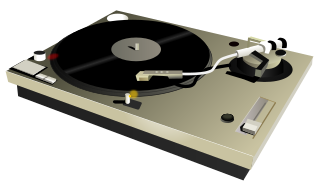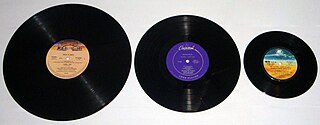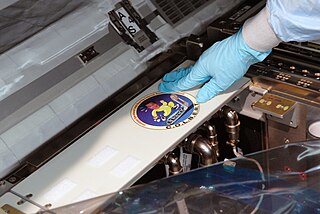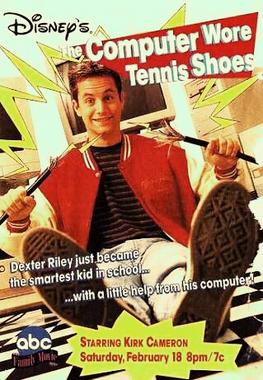
A phonograph, later called a gramophone, and since the 1940s a record player, or more recently a turntable, is a device for the mechanical and analogue reproduction of recorded sound. The sound vibration waveforms are recorded as corresponding physical deviations of a spiral groove engraved, etched, incised, or impressed into the surface of a rotating cylinder or disc, called a "record". To recreate the sound, the surface is similarly rotated while a playback stylus traces the groove and is therefore vibrated by it, faintly reproducing the recorded sound. In early acoustic phonographs, the stylus vibrated a diaphragm that produced sound waves coupled to the open air through a flaring horn, or directly to the listener's ears through stethoscope-type earphones.

The Compact Cassette, also commonly called a cassette tape, audio cassette, or simply tape or cassette, is an analog magnetic tape recording format for audio recording and playback. Invented by Lou Ottens and his team at the Dutch company Philips, the Compact Cassette was released in August 1963.

In music, a single is a type of release of a song recording of fewer tracks than an album or LP record, typically one or two tracks. A single can be released for sale to the public in a variety of physical or digital formats. Singles may be standalone tracks or connected to an artist's album, and in the latter case would often have at least one single release before the album itself, called lead singles.

A phonograph record, a vinyl record, or simply a record or vinyl is an analog sound storage medium in the form of a flat disc with an inscribed, modulated spiral groove. The groove usually starts near the outside edge and ends near the center of the disc. The stored sound information is made audible by playing the record on a phonograph.

The front-side bus (FSB) is a computer communication interface (bus) that was often used in Intel-chip-based computers during the 1990s and 2000s. The EV6 bus served the same function for competing AMD CPUs. Both typically carry data between the central processing unit (CPU) and a memory controller hub, known as the northbridge.

A sampler is an electronic musical instrument that records and plays back samples. Samples may comprise elements such as rhythm, melody, speech, sound effects or longer portions of music.

A decal or transfer is a plastic, cloth, paper, or ceramic substrate that has printed on it a pattern or image that can be moved to another surface upon contact, usually with the aid of heat or water.

The overwhelming majority of records manufactured have been of certain sizes, playback speeds, and appearance. However, since the commercial adoption of the gramophone record, a wide variety of records have also been produced that do not fall into these categories, and they have served a variety of purposes.
“The Computer Wore Menace Shoes" is the sixth episode of the twelfth season of the American animated television series The Simpsons. It first aired on the Fox network in the United States on December 3, 2000. In the episode, Homer buys a computer and creates his own website to spread gossip and fake news. However, when Homer starts writing conspiracy theories about flu shots, he is sent to an island where people who know too much are imprisoned.

Ethylene-vinyl acetate (EVA), also known as poly(ethylene-vinyl acetate) (PEVA), is a copolymer of ethylene and vinyl acetate. The weight percent of vinyl acetate usually varies from 10 to 50%, with the remainder being ethylene. There are three different types of EVA copolymer, which differ in the vinyl acetate (VA) content and the way the materials are used.

B'Sides Themselves is a compilation of single B-sides by the British neo-prog band Marillion, which was released on CD only in January 1988. This was the first time that those B-sides were made available in the then still relatively new Compact Disc format. However, vinyl LP and cassette versions were issued in June 1988.

Sound recording and reproduction is the electrical, mechanical, electronic, or digital inscription and re-creation of sound waves, such as spoken voice, singing, instrumental music, or sound effects. The two main classes of sound recording technology are analog recording and digital recording.
Robert Stanton Butler was an American film and Emmy Award-winning television director. He is best known for his work in television, where he directed the pilots for a number of series including Star Trek, Hogan's Heroes, Batman and Hill Street Blues.

KangaROOS is an American brand of sneaker originally produced from 1979 through the 1980s, with a later revival that continues in present. They were notable for having a small zippered pocket on the side of the shoe, large enough for a small amount of loose change, keys, etc.
The history of sound recording - which has progressed in waves, driven by the invention and commercial introduction of new technologies — can be roughly divided into four main periods:

The Computer Wore Tennis Shoes is a 1969 American science fiction comedy film starring Kurt Russell, Cesar Romero, Joe Flynn and William Schallert. It was produced by Walt Disney Productions and distributed by Buena Vista Distribution Company.

The Computer Wore Tennis Shoes is a 1995 American made-for-television science fiction comedy film directed by Peyton Reed and written by Joseph L. McEveety and Ryan Rowe. The film is a remake of the 1969 film of the same name. It premiered on ABC as an ABC Family Movie on February 18, 1995. It is the second in a series of four remakes of Disney live-action films produced for broadcast on the network during the 1994–95 television season, the other three being The Shaggy Dog, Escape to Witch Mountain, and Freaky Friday.
Gabber is a style of electronic dance music and a subgenre of hardcore techno, as well as the surrounding subculture. The music is more commonly referred to as hardcore, which is characterised by fast beats, distorted and heavy kickdrums, with dark themes and samples. This style was developed in Rotterdam and Amsterdam in the 1990s by producers like Marc Acardipane, Paul Elstak, DJ Rob, and The Prophet, forming record labels such as Rotterdam Records, Mokum Records, Pengo Records and Industrial Strength Records.

The singles discography of American country artist, George Jones, contains 182 singles. Of the total, 136 were released with Jones as the solo artist. In addition, 31 were issued with Jones being part of a collaboration. Thirdly, eight singles were issued with Jones being part of a featured act. Fourthly, seven released were promotional singles. Additionally, 14 songs that are not released as singles are included that made any major chart. Finally, 21 music videos which were first issued as singles are also listed. Jones had his first chart success in 1955 with several top ten Billboard Hot Country Songs singles: "Why Baby Why", "What Am I Worth" and "You Gotta Be My Baby". After several more top ten releases, "White Lightning" became his first to top the Billboard country chart. Along with "Who Shot Sam", both singles were also his first to make the Hot 100 charts.

The Dexter Riley film series consists of American science fiction-comedy films, centered around an eponymous college student. The films, produced by The Walt Disney Company and taking place at the fictional Medfield College, follow the science class led by Professor Quigley, and their experiments, projects, and adventures. The college, under the direction of Dean Eugene Higgins becomes involved in the nefarious plans of billionaire-turned-criminal, A. J. Arno.
















